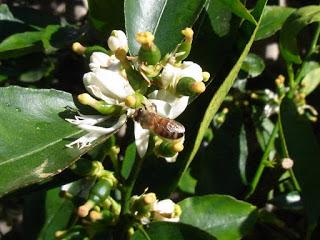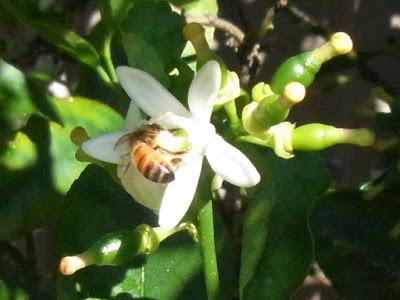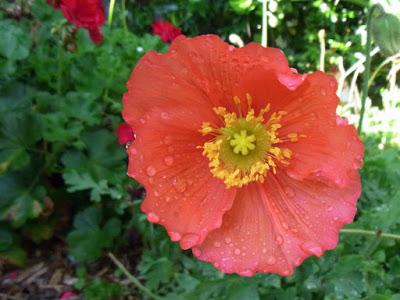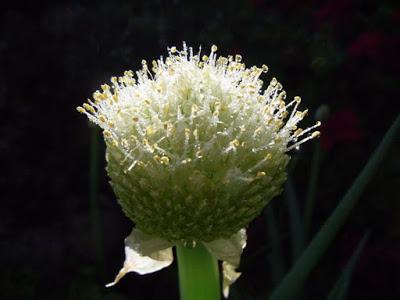If there is one thing I don't want in my garden, it's an automated watering system. Without the daily pleasure of getting out there and hand-watering the garden each morning, I don't think I would enjoy gardening one-tenth as much as I do right now. And I am sure I would miss out on seeing a lot, as well.
This morning was a classic example of what I mean. Forecast is a sunny day, max of 27°C. Doesn't get much better. But I have baby seedlings of lettuce, shallots and coriander to mollycoddle, and the newly planted New Guinea impatiens will love a good dose of tropical-style "hot and humid" — it will make them feel like they're back up in Port Moresby for a day.
And so I did a very enjoyable "lap" of the garden, watering the thirsty and stopping off to clean and refill our two birdbaths while I had the hose in my hand.
I wasn't the only person out there, of course. I had company. Dozens of bees humming their tunes were busily collecting pollen, sometimes buzzing close to my head as they scooted around their mysterious highways in the sky.

Grand Central Station for our garden's bees right now is our Tahitian lime tree, which is covered 50/50 in white flowers and green fruit buds that used to be flowers. The closer I got to the lime tree, the louder the hum became.

I love the thoroughness of bees. They don't miss a thing, they don't miss a single grain of pollen if they can help it. They dive deep into flowers and come out covered in their fluffy yellow harvests.

Of course bees' diligence is also beautifully fair. If you're a flower in this garden, expect a visit from the Bee Patrol. No exceptions made. They don't miss a thing. (Although, speaking of missing things, you'll have to believe me that there was a bee there just a moment before I clicked the digital camera button. They're a terribly difficult subject for an amateur photographer like me to capture every time.)

Just for fun, I like to let a few of our vegetables live out a complete life cycle (I think it's latent vegetable-harvesting guilt at work, a product of me thinking far too much). Here's a shallot (spring onion) flower dusted with water droplets. And yes, it's a waypoint for the loyal, hard-working members of the Pollen Gatherers Union.
In our world of endangered species, it's sometimes hard to wrap your brain around this concept when your own little sheltered existence is filled with these endangered creatures, the humble bee. I read the scientific stories and many newspaper reports and am filled with the same helpless sadness that I am sure so many of you share with me about the dwindling numbers of bees in so many countries.
But that word "helpless" is misleading. There actually is a little bit I can do to help, and I do it in my garden.
For starters, I use very few pesticides at all, and only organic ones occasionally, and none of them in the mornings or evenings, when the bees are about.
Next, I grow a good variety of flowers wherever I can. It doesn't matter which ones, as far as the bees are concerned. Even vegies well past their "harvest-by" dates can help. And if you can also manage it, try to populate your garden with plants so that you have something in flower every month. In Sydney's garden-friendly climate that's a lot easier to do than elsewhere.
That's the basics of being friendly to bees. It's only a small, very local gesture, but the more people thinking and acting locally, the better off are our bees.
